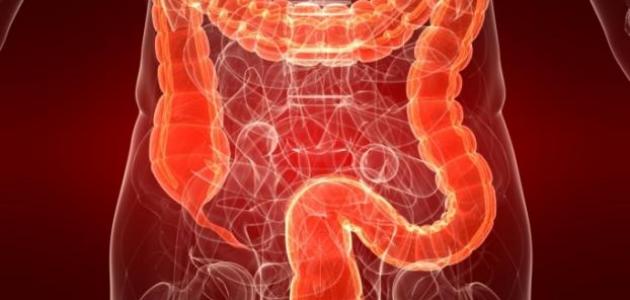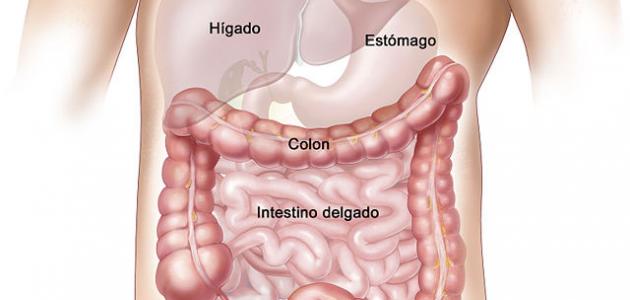Contents
Digestive disorders
The length of the human digestive system is more than six meters, and it consists of different parts, including the stomach, the small intestine, and the colon. The main role of the stomach and small intestine is to break down and absorb food, as it absorbs 95% of the available nutrients. The remainder of water and nutrients after food leaves the small intestine , and the colon works to convert waste products into safe compounds by neutralizing digestive acids and enzymes so that they pass from the body without causing any harm, and in addition, the bacteria in the colon produce essential vitamins . , Like biotin and vitamin K, and the waste is fermented, producing about 1.7 liters of gas daily. [1]The normal transit time for food through the intestine is about 24 hours, and therefore some people can excrete waste as a result of moving the bowel once a day, and it should be noted that some disturbances may occur if the transit time is too fast, causing diarrhea , or too slow, What causes constipation or bloating, and the reason for these problems is poor nutrition, disease, or infection, in addition to an unhealthy lifestyle such as lack of exercise and eating irregularly. [1]
Colon washing
Colon washing is done by several methods, including colon hydrotherapy or colon irrigation, a process in which the colon is gently rinsed using large amounts of warm water, sometimes up to about sixty liters, in addition to other substances such as herbs and coffee , to remove stool, Gas, and mucus, which allows vital nutrients to be absorbed more easily. Small amounts of water may be used and left in the colon for a short period before being removed in some cases. Colon washing also refers to the process by which medications are taken orally or rectally to cleanse the colon of waste products. Colon washing is usually used as a preparation for medical procedures such as colonoscopy , and some alternative medicine practitioners use colon washing for other purposes, such as detoxification. [2][3] [4]
Types of colon wash
Types of colon washes include: [4]
- Colon washing using medications and supplements: Some medications and dietary supplements used for colon washing are taken orally, or used rectally , and in both cases, these treatments help to expel the contents of the colon, examples include enemas, laxatives, herbal teas, and enzymes , And magnesium.
- Re colon: includes this process to pump water using a low - pressure pump or tank based on gravity, through a small tube is inserted in the rectum, and after becoming the water inside the colon, the therapist massage the abdomen, then the patient to remove water As is the case with a regular bowel movement , and the session may last for an hour, and the patient may need to repeat this process, and it is possible for the therapist to use enzymes, herbs, coffee, and probiotics with water, in addition to that he may use a variety of water pressures and temperatures.
The importance of colon washing
Proponents of colon washing believe that toxins in the digestive system can cause a variety of health problems such as arthritis , allergies, and asthma , and they also believe that colon washing improves health by removing toxins, increasing energy, and boosting the immune system, and they claim that colon washing improves ability. It helps in losing weight and reducing the risk of colon cancer . However, there is no evidence that colon washing produces these effects, as the body can cleanse itself by itself through many processes, including the following: [3] [4]
- The natural bacteria in the colon are able to detoxify food waste.
- The liver neutralizes toxins in the body.
- The mucous membranes of the colon prevent unwanted substances from entering the blood and tissues.
- The lining of the intestine regenerates itself faster than any other tissue in the body, which prevents the accumulation of harmful substances.
- Increasing the number of times you are excreted daily does not improve weight loss , because the body absorbs most of the calories before they reach the large intestine.
Colon lavage complications
There are some potential side effects of colon washing, including the following: [4]
- Suffering from vomiting, nausea, and cramps.
- Incidence of dizziness and dehydration.
- Mineral imbalance.
- The effect on drug absorption on the day of the procedure itself.
- Causing a bowel perforation.
- Infection.
- Depletion of beneficial natural gut bacteria.
- The occurrence of an allergic reaction due to the processor adding other substances to the water during colon irrigation.
It should be noted that the probability of infection side effects increases if the person is suffering from diverticulitis , or ulcerative colitis , or Crohn 's disease , or hemorrhoids severe, or tumors in Rectal or colon, or heart disease, or kidney disease, or in the event of a recent intestinal surgery.
Important advice
If a person decides to try colon washing, the following precautions should be taken: [3]
- Talking to medical service providers about medications and diseases such as kidney or heart disease that a person suffers from.
- Ensure that the healthcare provider uses disposable equipment that has not been used by other people.
- Get a list of herbal ingredients and other products used for colon washing, as some ingredients can cause health problems.
- Drink plenty of fluids during colon washing to avoid dehydration.
References
- ^ A b "How To The Digestive Systems Works" , Www.colonic-association.org , Retrieved 29-3-2018. Edited.
- ↑ "Colon Hydrotherapy" , www.hippocratesinst.org , Retrieved 29-3-2018. Edited.
- ^ A b v "Is colon cleansing a good way to eliminate toxins from your body?" , www.mayoclinic.org , Retrieved 29-3-2018. Edited.
- ^ A b t w "Natural Colon Cleansing: Is It Necessary ?" , www.webmd.com , Retrieved 29-3-2018. Edited.

